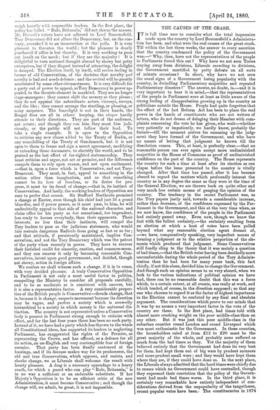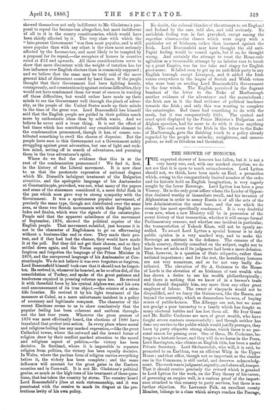THE CAUSES OF THE CRASH.
IT is full time now to consider what the total impression made upon the country by Lord Beaconsfield's Administra- tion has been, and what were the real causes of the great crash. Till within the last three weeks, the answer to every assertion that the country condemned the policy of the Government was,—" Why, then, have not the representatives of the people in Parliament found this out ? Why have we not seen Tories staying away from divisions, Liberals crowding to divisions, the Government mortified by petty defeats on all sorts of minute occasions ? In short, why have we not seen the usual signs of a Government losing popularity with the country, in dwindling Parliamentary majorities and repeated Parliamentary disasters ?" The answer, no doubt, is,—and it is very important to bear it in mind,—that the representatives of the people in Parliament were at least as little aware of the strong feeling of disapprobation growing up in the country as politicians outside the House. People had quite forgotten that the effect of the last Reform Act has been to place the real power in the hands of constituents who are not writers of letters, who do not dream of deluging their Member with com- plaints concerning the vote he has given, who wait—whether very patiently or impatiently, we hardly know, probably the former—till the moment arrives for summing up the judg- ment they have formed of the Government, and who have no means of letting that judgment be known till the dissolution comes. This, at least, is perfectly clear,—that no reasonable person can ever again accept mere undiminished majorities in the House of Commons as proof of undiminished confidence on the part of the country. The House represents the country for such a time at least after its election as can elapse before the issue presented to the country is vitally changed. After that time has passed, after it has become absurd to regard the matters which profoundly interest the country as in any degree the same as they were at the time of the General Election, we are thrown back on quite other and very much less certain means of gauging the opinion of the country. The tendency in the recent Parliament was, as the Tory papers justly said, towards a considerable increase, rather than decrease, of the confidence expressed by the Par- liament in the Government, and this at the very time when, as we now know, the confidence of the people in the Parliament had entirely passed away. Even now, though we know the fact with the fullest certainty,—the certainty resulting from an election at which a host of votes have been polled beyond what any reasonable election agent dreamt of, —we have, comparatively speaking, very imperfect means of forming a judgment as to the relative proportion of the ele- ments which produced that judgment. Some Conservatives still fondly cling to the theory that it was mainly a question of bad times,—that the British voter having been decidedly more uncomfortable during the whole period of the Tory Adminis- tration than he had been for many years back, this fact chiefly, if not this alone, decided him to change the Government. And though such an opinion seems to us very absurd, when we look to the various indications of political opinion we have had, there can be no reasonable doubt that this was a force which, to a certain extent, at all events, was really at work, and which tended, of course, in the direction supposed; so that any one who chooses to regard it as the factor of highest importance in the Election cannot be confuted by any final and absolute argument. The considerations which prove to our minds that it was by no means a very important factor in the vote of the country are these. In the first place, bad times told with almost more crushing weight on the poor middle-class than on any other. But it was just this poor middle-class in the suburban counties round London and round Liverpool which was most enthusiastic for the Government. In these counties, the householders rated at from £12 to £20 must be the great majority of the whole, and probably none suffered so much from the bad times as they. Yet the majority of them believed entirely that the Government had done its very best for them, had kept them out of big wars by prudent menaces and more prudent small wars ; and they would have kept them where they are, if they could have done so. In the next place, the Liberals always admitted that the hard times were chiefly due to causes which no Government could have controlled, though they expressed their conviction that the policy of the Govern- ment had made bad times worse. In the third place, it is certainly very remarkable how entirely independent of con- siderations derived from the unpopularity of the taxgatherer, recent popular votes have been.. The constituencies in 1874 showed themselves not only indifferent to Mr. Gladstone's pro- posal to repeal the Income-tax altogether, but most indifferent of all to it in the county constituencies, which would have been chiefly affected by it. The very class with which the " late-present Government " was then most popular, and is still more popular than with any other, is the class most seriously affected by the Income-tax, and most likely to be tempted by a proposal for its repeal,—the occupiers of houses in counties rated at £12 and upwards. All these considerations serve to show that mere discontent with the weight of taxation has far less influence over English electors than is commonly supposed ; and we believe that the same may be truly said of the more general kind of discontent caused by hard times. If the people thought that their Government had been fighting keenly, courageously, and conscientiously against serious difficulties, they would not have condemned them for want of success in warding off those difficulties, but would rather have made up their minds to see the Government well through the pinch of adver- sity, as the people of the United States made up their minds in the time of the great war. Lord Beaconsfield has himself said that the English people are guided in their politics much more by enthusiastic ideas than by selfish wants. And we believe he never said a truer thing. It is not the effect of bad times which has contributed any considerable element to the condemnation pronounced, though it has, of course, con- tributed something to swell the chorus of dispraise. But the people have seen in this Government not a Government nobly struggling against great adversities, but one of light and reck- less mind, setting off in search of adventures, and pursuing them in the true adventurer's spirit.
Where do we find the evidence that this is at the root of the condemnation pronounced ? We find it, first, in the history of the Liberal movement. It is now clear to us that the passionate expression of national disgust which Mr. Disraeli's indulgent treatment of the Bulgarian atrocities, and the apologetic language of his Ambassador at Constantinople, provoked, was not, what many of the papers and some of the statesmen considered it, a mere fitful flash in the pan which soon gave way to strong sympathy with the Government. It was a spontaneous popular movement, of precisely the same type, though not distributed over the same area, as those two Scotch, movements with their English pre- ludes and finales, which were the signals of the catastrophe. People said that the apparent subsidence of the movement of September, 1876, showed the political caprice of the English people. That movement subsided, just because it is not in the character of Englishmen to go on effervescing without a business-like end in view. They made their pro- test, and if they had had the chance, they would have made it at the poll. But they did not get their chance, and so they settled down again, and the Tories suppoaed that they had forgiven and forgotten the language of the Prime Minister in 1876, and the unreproved language of his Ambassador at Con- stantinople. We do not believe it was ever forgotten or forgiven. Lord Beaconsfield himself took care that it should not be forgot- ten. He revived, it, whenever he boasted, as he so•of ten did, of the consolidation of Turkey, and spoke of the great patience and tenderness required in pressing reforms upon her. He revived it with threefold force by his cynical Afghan war, and his own cool announcement of its true object,—the seizure of a scien- tific frontier. He revived it by his light treatment of the massacre at Cabul, as a mere unfortunate incident in a policy of necessary and legitimate conquest. The character of the recent Elections seems to us to show conclusively that the popular feeling has been coherent and uniform through- out the last four years. Wherever the great protest of 1876 was most effectually heard, the elections of 1880 have translated that protest into action. In every place where moral and religious feeling has any marked expression,—like the great Cathedral towns, where the outward and the inward forms of religion draw by their conflict marked attention to the moral and religious aspect of politics,—the victory has been decisive. In Scotland, where it is impossible to separate religion from politics, the victory has been equally decisive. In Wales, where the puritan form of religion carries everything before it, the victory has been complete ; and the same influence will account for the great gains in the Eastern counties and in Cornwall. It is not Mr. Gladstone's political genius, so much as the high tone of his treatment of these ques- tions, that has taken the country by storm. The country heard Lord Beaconsfield's jibes at such statesmanship, and it was penetrated with the resolve to mark its disgust at the pre- tentious levity of his own• policy. No doubt, the colossal blunder of the attempt to set England and Ireland by the ears, told also, and told seriously. No anti-Irish feeling was, in fact, provoked, except among the superfine classes,—the classes which were angry with a particular set of Irishmen, rather than incensed against the Irish. Lord Beaconsfield may have thought the old anti- Papist feeling would be roused again, but if so, ho thought wrong. And certainly the attempt to treat the Home-rule agitation as a treasonable attempt by an inferior race to break up a great Empire, was far too false and stagey for English good-sense. It failed even to get up an anti-Irish party in any English borough except Liverpool, and it added the Irish voters everywhere to the league of Scotch and Welsh voters who were bent on sending Lord Beaconsfield's Government to the four winds. The English perceived in the flagrant bombast of the letter to the Duke of Marlborough another evidence of the adventurer and the mountebank ; the Irish saw in it the final evidence of political insolence towards the Irish ; and only this was wanting to complete the catastrophe. Bad times had something to do with the crash, but it was comparatively little. The cynical and cruel spirit displayed by the Prime Minister's Bulgarian and Afghan speeches, had far more to do with it than anything else. The cool scorn for the Irish in the letter to the Duke of Marlborough, gave the finishing touch to a policy already regarded by the people as unlucky, unrighteous, and unscru- pulous, as well as frivolous and theatrical.



































 Previous page
Previous page